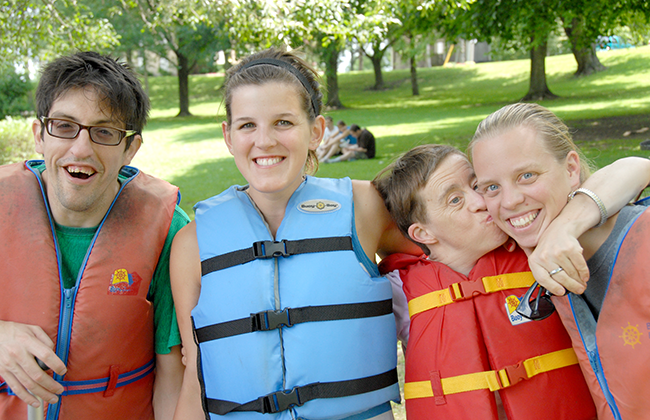In a world where leadership is glamorized, glorified, and even the subject of academic degrees, Marion van den Akker resists the word.
In a world where leadership is glamorized, glorified, and even the subject of academic degrees, Marion van den Akker resists the word.
“I don’t feel like a leader!” she says.
But her actions beg to differ. Van den Akker, an outreach worker at Helping Hands Street Mission in Hamilton, Ontario, has gotten involved in the RCA at a number of levels and has taken on several leadership roles over the years.
At her home church, Emmanuel Reformed Church in Woodstock, she serves as a youth leader, is a part of the congregation’s Ridder Church Renewal process, and chairs Anchor, an annual youth retreat for students in Ontario. At the denominational level, van den Akker has attended General Synod, was part of an emerging leaders group, and participated in Conversations, the event out of which Transformed & Transforming grew.
“When I step back and see where I’ve been involved, I guess I’m involved in leadership,” she says. “But I don’t always see myself as a leader. I don’t always feel capable or qualified.”
Much of van den Akker’s development happened not at the center of things but on the margins: at Camp Shalom, where she worked as a counselor and later as a coordinator for campers with special needs; on mission trips to places as varied as Kentucky and South Africa; and in her five years at Matthew 25 House, an intentional community in the heart of Hamilton.
“Jesus was in the margins; we are called there as well,” she says. “Leaders can be the ones that lead people into mission. Without the leaders in my life to nudge me in that way, I wouldn’t be where I am either.”
That sense of community, along with teamwork and reciprocity, is at the heart of van den Akker’s understanding of leadership.
“Whatever position I have been in that involved others, I always see it as team work,” says van den Akker. “Everyone brings a different strength to a group.” At Matthew 25 House, that meant everyone pitched in and used their gifts. The athletes organized street hockey, the bakers made Valentine cookies for sex trade workers, and the carpenters helped with community projects.
“Leaders are more working alongside of their team members,” she says. “You’re not higher or better— you work toward a goal together. It’s not a personal recognition story.”
Van den Akker says that the inhabitants of Matthew 25 House realized this about their own mission statement.
“There was a certain wording in our mission … that made it sound like we were there to help [our neighbors],” she says. “But then we realized we’re no better. … [So we] eliminated the language that divides into them and us.”
The posture of the mission statement played out in neighborhood interactions.
“When we first moved into the neighborhood, we made plates of cookies and went around introducing ourselves and handing them the plate of cookies, or invited neighbors in for a meal,” says van den Akker. “[Later,] neighbors invited us inside their home for coffee, or brought us baked goods. We realized we weren’t any more qualified or better to build community, and that in order to build a community, we can only be part of it if we are on both the giving and receiving end.”
Of her experiences as a leader, she reiterates the importance of humility and communal discernment: “I don’t ever want to get to that point where I say, ‘Oh yeah, I can do that,’ too boldly. A little bit of fear is good! I wouldn’t step into [a leadership role] myself—we need others to come alongside.
“Even if we don’t feel like leaders, we can still use our gifts to bless people.”





